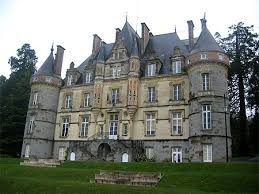Let us take a look at the delightful town of Bagnoles de l'Orne in Lower Normandy (dept. 61, Orne).
Bagnoles de l'Orne is a long established resort in the south of the Orne department of Normandy, south-west from Argentan and east of Domfront. It is the only Spa Town in Normandy and has an air of the exclusivity about it.
The town has a number of good restaurants and plenty of useful shops and other facilities. Leisure pursuits in Bagnoles include tennis and golf, and of course, thermal baths and treatments.
The town developed and prospered as a health resort around its thermal spa waters and grand buildings such as the 'Grand Hotel' as well as the picturesque lake, gardens, riverside walks, cascades and forest as well as many other attractions including good sports facilities.
As a consequence Bagnoles de l'Orne has a great deal of interesting 19th century architecture to enjoy, and its position in the Andaines Forest adds to the appeal of Bagnoles. It has successfully attracted tourists for well over 100 years and continues to be a popular destination. The spa waters are still a big attraction, click on some of the links on this page to find out more about the thermes-bagnoles and the many health and relaxation options available if you are visiting to relax and unwind. Tales of their amazing restorative powers include an ageing monk being given the power to leap from the highest rocks above the town and the story of a horse recovering from the brink of death.
Apart from the spa waters it is perhaps the fine examples of the "belle-epoque" (approx 1884-1914) architecture that Bagnoles de l'Orne is best known for. Particularly fine examples can be found in the "quartier belle-epoque" towards the south of the town.
The "belle-epoque" style came to an abrupt end with the First World War, to be replaced when the war ended by the new "art-deco" style, also very well represented in Bagnoles. During the "Roaring Twenties" this part of town grew up as a result of the rapid growth in popularity of the thermal leisure industry. The "bright young things" came to Bagnoles for entertainment on a level previously unknown in this quiet yet affluent town. The casino, concert and dance halls were built, along with facilities for horse racing and golf.
Art Deco was "the style" and it was all the rage in this era and in Bagnoles! The most obvious example is the Casino next to the lake, as well as the Church of Saint John the Baptist built around the same time which is also worth a visit.
The oldest part of Bagnoles de l'Orne is the "Quartier Tessé" and we recommend leisurely stroll to take in its history. The region around the town includes a large forested area (Andaines Forest), and is very popular with cyclists and walking enthusiats enjoying the Normandy countryside.
Close by is the medieval town of Domfront with its charmingly streets, well worth a visit on market day. The 15th century town of Lassay les Châteaux (dept. 53 Pays de la Loire) previously featured on our site is also well worth a visit. The floral town of St Fraimbault (dept.61 Normandy) is also a must as during the summer the whole village is bedecked with flowers, culminating in a weekend festival during August.
Property in the town itself is generally more expensive than property outside of the town, because Bagnoles is a popular town in which to live and offers good services and amenities. The area near Bagnoles is becoming more and more popular with foreign buyers; we predict prices are set to rise as it grows in popularity. So call us to make arrangements for viewing sooner rather than later!
 The Spa at Bagnoles de l'Orne.
The Spa at Bagnoles de l'Orne.
 Casino and Lake.
Casino and Lake.
 Hotel de Ville.
Hotel de Ville.
 Bagnoles de l'Orne from the air.
Bagnoles de l'Orne from the air.
Blog submitted by: David at Cle France.